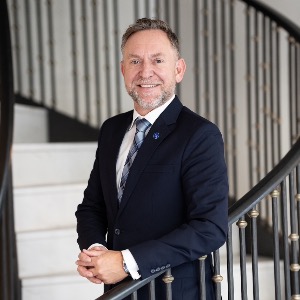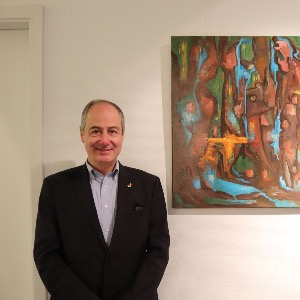Luxury Meets Diplomacy + EU Regulation + FDI Screening + Indonesia’s Economy + Global Warming + Russian Hybrid Threats + Energy Efficiency
According to the updated Energy Efficiency Directive (EU/2023/1791), what is the EU’s binding target for reducing final energy consumption by 2030?
11.7 %
 Dear Readers,
Dear Readers,
Welcome to the Diplomacy Berlin Newsletter.
This week we open with an interview with Jan Martensen, Director of Government Sales at the Waldorf Astoria Berlin, who reflects on how the city’s international clientele is changing and why trust remains the cornerstone of luxury hospitality for diplomats, delegations, and decision-makers alike. His insights give us a glimpse into how Berlin’s role as a host city is evolving, and what hospitality means in the age of global diplomacy.
Beyond Berlin, Europe is debating how to keep its economy secure from smarter regulation and investment screening to stronger responses against Russian hybrid threats. Energy policy is also moving forward with new efficiency goals, while further afield we’re watching shifts in Indonesia’s economy and the global warnings scientists are raising about life in a warmer world.
And before we begin, we extend our warm congratulations on upcoming national days to Zambia (24 October), Kazakhstan (25 October), Austria (26 October), and the Czech Republic (28 October). Moments like these remind us that diplomacy is not only about policy, but about celebrating the ties of identity and community that connect nations.
As always, thank you for joining us. If you would like to contribute articles, event coverage, or press releases for upcoming editions, please reach out at editorial@diplomacy.berlin.
With best regards,
Sigrid Arteaga
Luxury Meets Diplomacy: Jan Martensen on Hosting the World in Berlin
Jan Martensen is the Director of Government Sales at Waldorf Astoria Berlin, where he oversees relationships with embassies, government delegations, and international institutions. With extensive experience in hospitality, aviation, and diplomatic relations, he ensures the hotel delivers a seamless blend of trust, discretion, and world-class service. Located near the Zoological Garden, the Waldorf Astoria offers 232 rooms and suites and the Library Lounge with panoramic city views, ideal for high-level diplomatic receptions. A passionate culture and art enthusiast, Jan appreciates Berlin’s rich heritage, often visiting Museum Island, and plays a key role in shaping the city’s luxury hospitality landscape for the international community.

From your perspective as Director of Government Sales, how has the profile of the visiting international and governmental clientele in Berlin changed over the last two years, and what does this shift mean for luxury hospitality?
Over the past two years, Berlin has grown even more into its role as a true international hub — politically, culturally, and economically. What we notice is a more diverse clientele: delegations from regions that were previously less present, and also a younger generation of decision-makers who bring a different set of expectations to hospitality. For us, this means balancing two things: providing the tradition and reliability that remain essential, while also introducing innovative services that reflect this new dynamic. That balance is what keeps luxury hospitality in Berlin both relevant and forward-looking.
Considering your background in hospitality, aviation, and diplomatic relations, what is the single most critical element—be it discretion, protocol, or a specific service—that the Waldorf Astoria must consistently deliver to remain a trusted partner for high-level international guests?
There are many elements that matter — discretion, protocol, service — but if I had to choose one, it would be trust. Trust is built from discretion, from an uncompromising respect for protocol, and from service that leaves no room for doubt. High-level guests travel the world and experience excellence everywhere. But they return only to those places where they feel understood, protected, and respected. That is exactly what the Waldorf Astoria Berlin stands for: not a single service, but a culture of trust and care that defines the entire experience.
Looking ahead to 2026, what emerging trends or specific areas do you foresee driving the demand for high-end diplomatic events and hospitality services in the growing German capital?
Looking ahead to 2026, we see Berlin becoming a focal point for the conversations that shape our future — from technology and sustainability to security policy. These themes will increasingly define the demand for high-level diplomatic events and hospitality. What is particularly exciting is that diplomacy itself is evolving: it’s no longer just about traditional political encounters, but about dialogue between business, science, and culture. Our role is to create spaces and services that allow this new form of diplomacy to unfold at the highest possible standard.
Better Regulation Practices Across the EU – 2025
The OECD’s 2025 report evaluates rulemaking and regulatory practices across all EU Member States, assessing alignment with OECD standards for high-quality regulation. It examines three core tools—stakeholder engagement, ex ante impact assessment, and ex post evaluation—highlighting how countries apply them in line with EU law. The report identifies progress, challenges, and priorities for improvement, offering examples of best practices and actionable recommendations, and extends coverage to Bulgaria, Croatia, Romania, Cyprus, and Malta, providing a comprehensive benchmark for strengthening regulatory quality across Europe.
For diplomats, policymakers, and the academic community, this is particularly important because strong regulatory practices underpin governance quality, economic efficiency, and investor confidence. Understanding these trends helps identify potential areas for EU collaboration, informs trade and investment considerations, and highlights opportunities to align bilateral initiatives with evolving EU standards.
Read the full report on the OECD website.
Foreign Direct Investment (FDI) Screening Continues to Boost EU Economic Security
The European Commission’s fifth annual report shows that screening foreign direct investments (FDI) continues to protect EU security and public order. Notifications to the EU cooperation mechanism rose by 15% since 2021, with most cases (92%) resolved quickly and only 8% requiring detailed risk assessments—often in manufacturing, due to concerns over technology transfer and supply security. By the end of 2024, 24 EU Member States had national FDI screening legislation, and the Commission’s proposed revisions aim to mandate national screening mechanisms, harmonize procedures, and improve EU-wide cooperation. For diplomats, policymakers, and the academic community, this is particularly relevant because robust FDI screening strengthens economic security and indicates which investment and strategic sectors are prioritized across the EU.
Read the full report on the European Commission website.
What's Going on with Indonesia's Economy?
One year into President Proboa Sabianto’s term, Indonesia’s ambitious populist agenda—promising free school meals for nearly 90 million children, energy subsidies, and 8% growth—has run into serious economic challenges. Rising prices for essentials such as rice, cooking oil, and education, alongside austerity measures and spending cuts, are straining households and businesses. Tax hikes, layoffs, and growing informal employment, combined with youth job competition, have fueled civil unrest, including violent protests following the death of a young delivery worker. The government has responded with a near-billion-dollar stimulus, but uncertainty remains over whether confidence and sustainable growth can be restored. For diplomats and investors, these developments are critical because Indonesia’s economic stability affects regional trade, investment flows, and strategic partnerships.
Listen to the full episode on the official BBC Business Daily on Apple Podcasts.
Global Warning: Our future in a warmer world
Al Jazeera’s three-part documentary series explores the realities of climate change while highlighting innovative solutions. Episode 1, Into the Storm, examines extreme weather and melting ice in Greenland, rising sea levels, and ecological crises in Malawi and Siberia. Episode 2, Against the Tide, focuses on adaptation strategies, featuring sea barriers in the Netherlands and community resilience in Wales, Bangladesh, and Florida. Episode 3, Decarbonising the Global Economy, addresses the urgent transition from fossil fuels, showcasing global approaches in Ukraine, the US, Sweden, and Finland. By combining scientific insight with practical solutions, the series challenges viewers to take collective action. For diplomats, policymakers, and international partners, the series is particularly relevant because it highlights emerging climate risks and adaptation strategies that may inform bilateral cooperation, development assistance, and global environmental policy priorities.
Watch the full series on the official Al Jazeera website.
- Japan to strengthen cultural diplomacy with emerging nations by sending experts in Japanese music, language abroad. asianews.network
- India Tiptoes Around Trump’s Latest Claims on Russian Oil Purchases. nytimes.com
- Washington business lobby group pushes for US-Africa minerals finance. semafor.com
- Fortifying America’s Pacific Front Line Is Getting Expensive and Difficult. wsj.com
- How to Free Palestine – Turning the Gaza Cease-Fire Into Lasting Peace. foreigaffairs.com
- To Meet Pledges to Save Forests, Spending Must Triple, U.N. Report Says. nytimes.com
- Why Gradualism Can Help in Gaza. foreignaffairs.com
- US moves to cancel one of the world’s largest solar farms. ft.com
MEPs demand a unified EU response to Russian violations and hybrid warfare threats
The European Parliament has adopted a resolution condemning Russia’s airspace violations and hybrid attacks on EU infrastructure. MEPs call for coordinated EU-NATO action, including stronger sanctions on Russia and its enablers, and the implementation of drone defense measures such as the EU drone wall and Eastern Flank Watch. The resolution also emphasizes the need for a robust European Defence Union, improved civil-military coordination, and closer cooperation with Ukraine on drone technology and countermeasures. The measure passed with 469 votes in favor, 97 against, and 38 abstentions. For diplomats, policymakers, and security analysts, this is particularly significant because it signals a unified EU stance on hybrid threats, highlights strategic defense priorities, and may influence EU-Russia relations as well as regional security partnerships.
Read the full resolution on the official European Parliament website.
Energy Efficiency Directive: Advancing the EU’s energy efficiency goals
The European Commission is urging EU countries to implement key provisions of the Energy Efficiency Directive (EU/2023/1791) by 11 October 2025. The directive sets a binding target to reduce final energy consumption by 11.7% by 2030 compared to 2020 projections, through measures such as prioritizing energy-efficient solutions in new infrastructure, leading by example in the public sector, renovating at least 3% of public buildings annually, supporting vulnerable households, and promoting energy efficiency services. The Commission monitors progress via National Energy and Climate Plans and guides to help member states meet these targets. For diplomats, policymakers, and energy stakeholders, this is particularly relevant because it highlights EU priorities in sustainable energy, informs potential investment and collaboration opportunities, and signals regulatory expectations that may affect trade and bilateral energy initiatives.
To read more about the Energy Efficiency Directive, visit the European Commission website.
The Stockholm International Peace Research Institute (SIPRI) provides authoritative analysis on conflict, arms control, and military spending worldwide. Its research tracks trends in international security, including arms transfers, peacekeeping efforts, and defense budgets, offering policymakers and the public data-driven insights to understand and address global security challenges. Follow SIPRI to stay informed on the latest developments shaping global peace and security.
Berlin Freedom Week 2025
Berlin Freedom Week (October 22–29) invites citizens, visitors, and local institutions to engage in a week of exhibitions, workshops, talks, and live events dedicated to the theme of freedom in all its forms. From arts & culture to digital rights and urban living, the festival spans the city with venues ranging from the Brandenburg Gate to galleries in Kreuzberg and Mitte. Whether you’re exploring the “Freedom-now” exhibition on civil rights, joining a hackathon on open data, or attending a late-night film screening reflecting on Berlin’s divided past, the week blends history, dialogue, and action. It’s a refusal to take freedom for granted and a call to explore its meaning in today’s shifting political and technological landscape.
Visit their website to know more.
Berlin Conference 2025 – New Paths to Democracy: Cultural Participation as an Instrument of Democratic Resilience
The Berlin Conference 2025, hosted by the Stiftung Zukunft Berlin, gathers political leaders, business innovators, and civil society actors from November 6-7 for full-day exchange about the future of Europe, urban life, and global co-operation. The conference includes keynote speeches, panel discussions, and interactive sessions around themes such as digital transformation, sustainable cities, and multilateral governance.
For those interested in participating, you can register via the Stiftung Zukunft Berlin website-spaces are limited, so early registration is recommended.
“Form in Flow” at the Embassy of Ecuador
On October 14, Ambassador Vicente Albornoz of Ecuador opened the exhibition Form in Flow by artist Eduardo Flores Abad at the Embassy of Ecuador in Berlin. The show is a contemplative journey into how art, nature, and culture intertwine. Among the highlights are references to the Valdivia culture ancient clay figures that speak of a civilization deeply connected to earth and water, now reimagined as design elements within Flores Abad’s modern works. His paintings, including pieces like Blue Forests, layer shapes, tones of green and blue, and experimental techniques to reflect both natural harmony and human impact on the environment.
Flores Abad, born in Guayaquil and now based in Hanover, blends philosophy, composition, and visual experimentation across media, supported by grants from Lower Saxony and the Dr. Christiane Hackerodt Art and Culture Foundation. The exhibition is open to the public on weekdays until mid-December at the Embassy of Ecuador, Joachimsthaler Straße 12 offering Berliners a chance to step into an artistic meditation on form, flow, and our relationship with nature.

Borchardt
Step into Borchardt, where elegance, history and the hum of Berlin’s upscale social scene converge under one roof. Nestled near Gendarmenmarkt, this storied restaurant has been a go-to for artists, politicians, and well-heeled locals since the 19th century. The signature dish is a perfectly cooked Wiener Schnitzel that arrives at your table precisely as the restaurant’s tradition dictates: brought out whole, then cut and served in a flourish. The interior blends vintage charm and modern service, while the cocktail bar keeps the mood upbeat before and after dinner. Visit their website to reserve your table.
